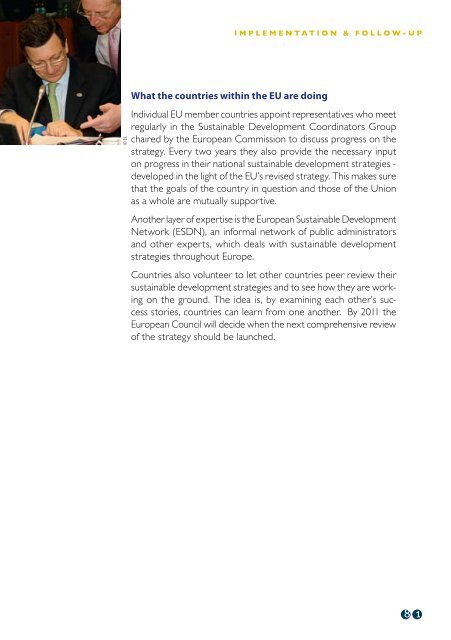A SUSTAINABLE FUTURE IN OUR HANDS - To Parent Directory
A SUSTAINABLE FUTURE IN OUR HANDS - To Parent Directory A SUSTAINABLE FUTURE IN OUR HANDS - To Parent Directory
Implementation & follow-upThe Commission’s progress report looks at how policies are working,how individual countries are doing, and puts forward ideasabout the next steps to take. One of their sources of informationis the data collected by Eurostat which regularly monitors theprogress being made on sustainable development in Europe.The first step in monitoring progress is to have a clear idea of whatis to be measured and to make sure that figures are comparableacross countries, and over time – comparing like with like.To make this possible, Eurostat has developed a set of ‘indicators’,which are regularly reported upon. Eurostat’s 2007 report onSustainable Development Indicators can be found at: ec.europa.eu/sustainable/The indicators can be clearly measured throughout the Union,showing what is happening on the ground. For example, the themepublic health has, as its main indicator healthy years lived, by gender.Measuring this factor across the EU will show where we are nowand, thanks to regular data collection, whether the situation isgetting better or worse. But how long men and women are livinghealthily is only a very broad indicator. There is a range of otherswhich reflect the complexity of the situation in more detail, suchas factors which influence the state of health, including obesity andsmoking, exposure to pollutants, and production of toxic chemicals.Indicators will be developed and new ones created with the inputof the countries that make up the EU.Regularly updated, the Eurostat information is there for you tocheck out on the net if you have access to it and will give you apicture of progress towards sustainable development objectivesacross the EU.The European Parliament has a part to play, contributing its views,cooperating with the Council and the Commission and liaisingwith national parliaments. The Committee of the Regions and theEconomic and Social Committee also provide input.080
Implementation & follow-up© ECWhat the countries within the EU are doingIndividual EU member countries appoint representatives who meetregularly in the Sustainable Development Coordinators Groupchaired by the European Commission to discuss progress on thestrategy. Every two years they also provide the necessary inputon progress in their national sustainable development strategies -developed in the light of the EU’s revised strategy. This makes surethat the goals of the country in question and those of the Unionas a whole are mutually supportive.Another layer of expertise is the European Sustainable DevelopmentNetwork (ESDN), an informal network of public administratorsand other experts, which deals with sustainable developmentstrategies throughout Europe.Countries also volunteer to let other countries peer review theirsustainable development strategies and to see how they are workingon the ground. The idea is, by examining each other’s successstories, countries can learn from one another. By 2011 theEuropean Council will decide when the next comprehensive reviewof the strategy should be launched.081
- Page 29 and 30: Sustainable Development Consumption
- Page 31: Consumption & production© CorbisWh
- Page 35 and 36: Consumption & productionOften the m
- Page 37 and 38: Sustainable Development Natural res
- Page 39 and 40: Natural resourcespolar bears. It is
- Page 41 and 42: © CorbisNatural resourcesdioxin in
- Page 43 and 44: Natural resourcesTo manage the amou
- Page 45 and 46: Sustainable Development Public heal
- Page 47 and 48: Public healthDidyou know…More peo
- Page 49 and 50: Public healthDidyou know…Accordin
- Page 51 and 52: Public healthhelp you to cut back.
- Page 53 and 54: Sustainable Development Social incl
- Page 55 and 56: Social inclusion© CorbisDidyou kno
- Page 57 and 58: Social inclusion• Promote employm
- Page 59 and 60: Social inclusionthemselves trapped
- Page 61: Not really a ‘people person’ bu
- Page 64 and 65: Global povertyHeart-rending, indivi
- Page 66 and 67: Global povertyMaking a differenceWh
- Page 68 and 69: Sustainable Development Cross-cutti
- Page 70 and 71: Cross-cutting policiesEducation - s
- Page 72 and 73: Cross-cutting policiesResearchThe c
- Page 74 and 75: Cross-cutting policies074Taxing ene
- Page 76 and 77: Cross-cutting policies© ECWhat’s
- Page 78 and 79: Sustainable Development Implementat
- Page 82 and 83: european CommissionSecretariat-Gene
- Page 84: FiniSHedwitH me?dOn’t tHrOwme AwA
Implementation & follow-up© ECWhat the countries within the EU are doingIndividual EU member countries appoint representatives who meetregularly in the Sustainable Development Coordinators Groupchaired by the European Commission to discuss progress on thestrategy. Every two years they also provide the necessary inputon progress in their national sustainable development strategies -developed in the light of the EU’s revised strategy. This makes surethat the goals of the country in question and those of the Unionas a whole are mutually supportive.Another layer of expertise is the European Sustainable DevelopmentNetwork (ESDN), an informal network of public administratorsand other experts, which deals with sustainable developmentstrategies throughout Europe.Countries also volunteer to let other countries peer review theirsustainable development strategies and to see how they are workingon the ground. The idea is, by examining each other’s successstories, countries can learn from one another. By 2011 theEuropean Council will decide when the next comprehensive reviewof the strategy should be launched.081



